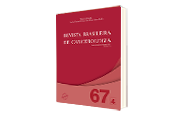Serum Albumin is Independent Predictor of Hospital Mortality in Patients with Cancer
DOI:
https://doi.org/10.32635/2176-9745.RBC.2021v67n4.1209Keywords:
Serum Albumin, Hospital Mortality, Nutritional Assessment, Neoplasms, PrognosisAbstract
Introduction: Cancer is one of the leading causes of morbidity and mortality worldwide. There are few studies showing adjusted models with other predictors of mortality by a conceptual model perspective. Objective: The objective of this study was to verify the prediction of albumin and Prognostic Nutritional Index (PNI) with in-hospital mortality in cancer patients. Method: Retrospective study was performed from 2014 to 2016 with 262 cancer patients (gastrointestinal tract, male genital organs, breast, metastasis, urinary tract, head and neck and others). Demographic data, blood counts, C-reactive protein, albumin, and haematological indexes (Prognosis nutritional index - PNI, Neutrophils to lymphocytes ratio - NLR, Monocytes lymphocytes ratio - MLR, Platelets to lymphocytes ratio - PLR and Platelets to albumin ratio - PAR), nutritional diagnoses and hospital outcomes (discharge or death) were collected. The cumulative probability of death was calculated by Kaplan-Meier curves, and survival analyses were performed using the Cox proportional hazards model. Results: The frequency of death among the study patients was 10.7% (28). Among the patients who died, 99.2% (26) presented some degree of malnutrition (p=0.004). In the multivariate analysis, serum albumin (<3 g/dL) was independently associated with in-hospital mortality (HR=3.43, 95% CI 1.11-10.63). On the other hand, the PNI was not associated with in-hospital mortality. Conclusion: Serum albumin levels during hospitalization were predictors of in-hospital mortality in the population evaluated. These results suggest that the serum levels of this protein can be used in clinical practice, adding prognostic information in patients with cancer.
Downloads
Downloads
Published
How to Cite
Issue
Section
License
Os direitos morais e intelectuais dos artigos pertencem aos respectivos autores, que concedem à RBC o direito de publicação.

This work is licensed under a Creative Commons Attribution 4.0 International License.









